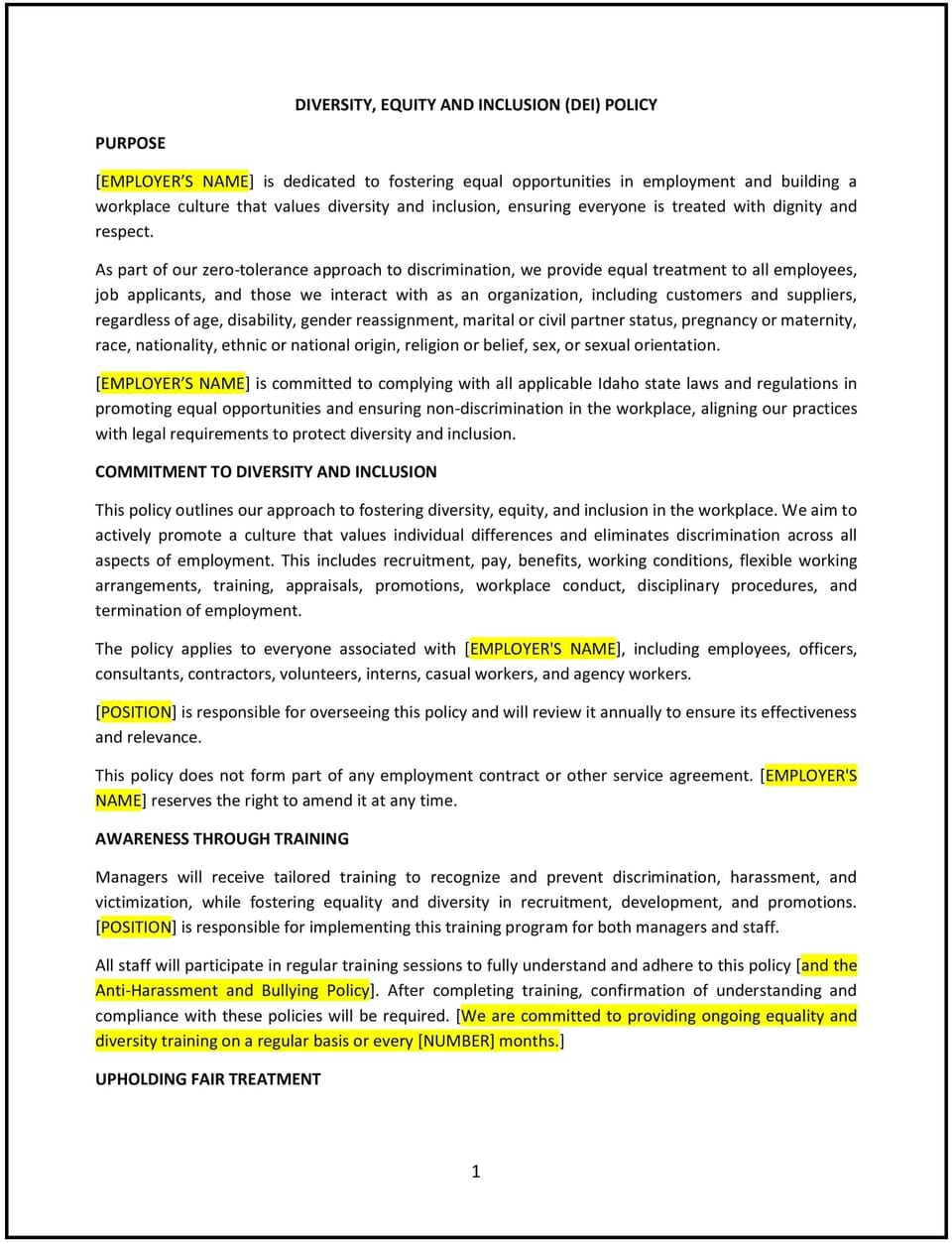Diversity, equity and inclusion (DEI) policy (Idaho): Free template

Diversity, equity, and inclusion (DEI) policy (Idaho)
A diversity, equity, and inclusion (DEI) policy helps Idaho businesses create a workplace that values and respects individuals from all backgrounds, experiences, and perspectives. This policy outlines the business’s commitment to fostering a culture of fairness, belonging, and equal opportunity for all employees. It reflects the business’s dedication to promoting diversity, addressing inequities, and ensuring inclusivity in all aspects of operations.
By implementing this policy, businesses can build a more innovative, engaged, and productive workforce while contributing to a more equitable society.
How to use this diversity, equity, and inclusion (DEI) policy (Idaho)
- Define DEI principles: Clearly articulate the business’s commitment to diversity, equity, and inclusion, including definitions of key terms and the importance of these values.
- Outline goals and objectives: Specify the business’s DEI goals, such as increasing representation, reducing bias, or creating inclusive policies and practices.
- Establish accountability: Assign roles and responsibilities for implementing and monitoring DEI initiatives, such as a DEI committee or designated leadership.
- Promote inclusive practices: Provide guidelines for fostering inclusivity in hiring, promotions, training, and day-to-day interactions.
- Address bias and discrimination: Outline procedures for reporting and addressing incidents of bias, discrimination, or harassment in the workplace.
- Encourage employee engagement: Create opportunities for employees to participate in DEI initiatives, such as affinity groups, training programs, or feedback sessions.
- Measure progress: Establish metrics and processes for tracking progress toward DEI goals and regularly reporting on outcomes.
- Review and update: Regularly review the policy to ensure it remains aligned with the business’s values, employee needs, and Idaho laws.
Benefits of using this diversity, equity, and inclusion (DEI) policy (Idaho)
This policy provides numerous benefits for Idaho businesses:
- Enhances innovation: A diverse workforce brings varied perspectives and ideas, driving creativity and problem-solving.
- Improves employee engagement: Inclusive workplaces foster a sense of belonging, increasing employee satisfaction and retention.
- Attracts top talent: Demonstrating a commitment to DEI can help businesses attract a diverse pool of candidates and stand out as an employer of choice.
- Strengthens decision-making: Diverse teams make more informed and balanced decisions by considering multiple viewpoints.
- Builds a positive reputation: A strong DEI policy enhances the business’s reputation among customers, partners, and the community.
- Promotes fairness: The policy ensures equitable treatment and opportunities for all employees, reducing disparities and fostering trust.
- Aligns with societal values: A commitment to DEI reflects the business’s dedication to social responsibility and ethical practices.
Tips for using this diversity, equity, and inclusion (DEI) policy (Idaho)
- Communicate the policy effectively: Share the policy with employees during onboarding, training sessions, and through internal communications to ensure awareness.
- Train employees: Provide training on DEI principles, unconscious bias, and inclusive practices to foster a culture of understanding and respect.
- Lead by example: Encourage leadership to model inclusive behavior and demonstrate a commitment to DEI initiatives.
- Create accountability: Assign roles and responsibilities for implementing and monitoring DEI efforts, and regularly review progress.
- Encourage feedback: Create channels for employees to share their experiences, suggestions, and concerns related to DEI.
- Measure outcomes: Track key metrics, such as workforce diversity, employee satisfaction, and retention rates, to assess the impact of DEI initiatives.
- Review the policy regularly: Update the policy as needed to reflect changes in employee needs, societal expectations, or Idaho laws.
Q: Why should Idaho businesses have a DEI policy?
A: A DEI policy helps businesses create a fair, inclusive, and innovative workplace, attract top talent, and align with societal values.
Q: What are the key components of a DEI policy?
A: A DEI policy should include definitions of diversity, equity, and inclusion; goals and objectives; accountability measures; and procedures for addressing bias and discrimination.
Q: How should businesses promote inclusivity in hiring?
A: Businesses should implement inclusive hiring practices, such as using diverse interview panels, reducing bias in job descriptions, and offering equitable opportunities for all candidates.
Q: What should businesses do to address bias and discrimination?
A: Businesses should establish clear procedures for reporting and addressing incidents of bias, discrimination, or harassment, and provide training to prevent such behaviors.
Q: How can employees contribute to DEI initiatives?
A: Employees can participate in DEI initiatives, such as affinity groups, training programs, or feedback sessions, to support a culture of inclusivity.
Q: How should businesses measure DEI progress?
A: Businesses should track metrics such as workforce diversity, employee satisfaction, and retention rates, and regularly report on outcomes to assess progress.
Q: How often should the policy be reviewed?
A: The policy should be reviewed annually or as needed to reflect changes in employee needs, societal expectations, or Idaho laws.
This article contains general legal information and does not contain legal advice. Cobrief is not a law firm or a substitute for an attorney or law firm. The law is complex and changes often. For legal advice, please ask a lawyer.


